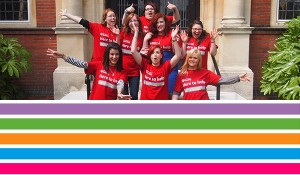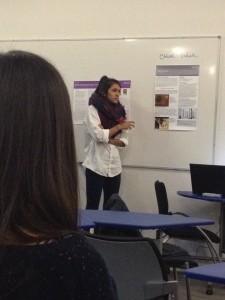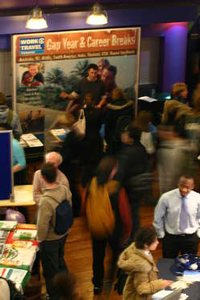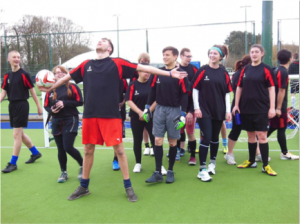Charlotte Crouch is a current Masters candidate in the Graduate Centre for Medieval Studies at the University of Reading. She is also a University of Reading graduate, with a degree in French and History (2014). She has recently received funding from the Arts & Humanities Research Council (South, West and Wales Consortium) to pursue a PhD co-supervised by the University of Reading (“The Courtenay Heiresses: Aristocratic Prestige, Female Agency and Royal Control in Thirteenth Century France.”) One of Charlotte’s research interests is the depiction of the royal consort in early medieval chronicles, particularly the historical representation of women, whether idealised or vilified.
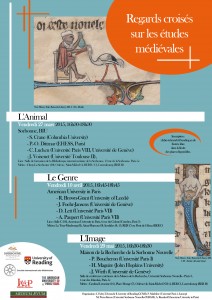 On 10 April 2015, Charlie joined two French Medievalists from the Department of Modern Languages and European Studies at the University of Reading, Dr Irene Fabry-Tehranchi and Prof. Catherine Leglu, in attending the second of three Paris workshops focusing on Animal, Gender and Image in Medieval Studies. The workshops aim at developing an international academic exchange, promoting the crossing of disciplinary boundaries within Medieval Studies and building new tools for research, through the contribution and collaboration of French and international academics. They were co-organised by Irene Fabry-Tehranchi, and sponsored by the International Medieval Society (Paris), the American University in Paris, Université Paris 1-LAMOP, Université Paris 3-CEMA, the Society for the Study of Medieval Literature and Languages-Medium Aevum (UK) and the University of Reading. We’ve asked Charlie to share her thoughts on this important research trip and opportunity for intellectual exchange:
On 10 April 2015, Charlie joined two French Medievalists from the Department of Modern Languages and European Studies at the University of Reading, Dr Irene Fabry-Tehranchi and Prof. Catherine Leglu, in attending the second of three Paris workshops focusing on Animal, Gender and Image in Medieval Studies. The workshops aim at developing an international academic exchange, promoting the crossing of disciplinary boundaries within Medieval Studies and building new tools for research, through the contribution and collaboration of French and international academics. They were co-organised by Irene Fabry-Tehranchi, and sponsored by the International Medieval Society (Paris), the American University in Paris, Université Paris 1-LAMOP, Université Paris 3-CEMA, the Society for the Study of Medieval Literature and Languages-Medium Aevum (UK) and the University of Reading. We’ve asked Charlie to share her thoughts on this important research trip and opportunity for intellectual exchange:
In November last year I was asked if I would be interested in going to one of the three workshops that the International Medieval Society had organised for this Spring in Paris. I chose the workshop focused on gender, in which academics from several countries were due to meet and exchange methods, ideas and research on the theme. As an MRes student of Medieval Studies, this seemed like a perfect opportunity to network and exchange views on a topic to which I dedicated my undergraduate dissertation, and which now plays a prominent role in my Masters.

The manuscripts reading room at the Bibliothèque Nationale in Paris (Richelieu site) – dream working conditions, but access to the reserved medieval manuscripts is a true ‘parcours du combattant’ (really challenging)
The workshop was due to take place on 10th April, but I headed over three days before to start some research on my dissertation. When I arrived at the Bibliothèque Nationale in Paris, I went straight into an interview to be given a reader’s card and to be registered on the system, so I was thrown in at the deep end straight away! I had already found the codes of the manuscripts and documents I wanted to consult, so I ordered those and spent the rest of the day consulting some of the books in the “Salle Ovale”, a stunning circular shaped room with bookshelves four stories high, and a huge glass ceiling – dream working conditions! Over the next two days, I was able to access medieval charters and documents that were on microfilm. They provided fascinating insights into some of the contracts of marriage between the Norman aristocracy and the French kings in the thirteenth century; one of them even came complete with a sketch of a knight in the margin.

Basilica of St Denis abbey, the burial place for the Kings of France
On the third day, I went to the Basilica of Saint-Denis, on the outskirts of Paris. I had always wanted to visit this famous necropolis of the medieval French royal family, and I knew one of the princes I have been researching, Philip Hurepel, had been buried there. The tombs are beautiful; you can still see some colour on the retrospective tomb of the infamously evil Fredegonde, now over 800 years old. I was lucky enough to speak to a researcher there, who dug around in the archives for me to try to find a trace of what Philip Hurepel’s tomb may have looked like: unfortunately he could not find anything, possibly a sign of Philip’s status as a bastard.
After having spent three exciting days researching, it was time to head to the workshop, which was held at the American University in Paris. There was an impressive turn out of students, researchers and lecturers from a wide range of disciplines, such as art history and literary studies. Dr Irène Fabry-Tehranchi introduced the workshop, and Professor Didier Lett, from Université Paris VII began the first talk, a captivating introduction to gender from a French perspective. I was genuinely surprised to hear that there is still a real shortage of French historians working on this topic, and that after a brief surge in interest in the years 2000, gender studies have again recently seen a slump. This is possibly because of tensions on the French political scene surrounding the legalisation of marriage and adoption for same-sex couples in 2013, opposed by conservative groups criticising what they call ‘la théorie du genre’.
 Similarly, when discussing a core problem of how gender is viewed amongst French academics, Professor Lett warned that many wrongly presume studies of gender to be the same as studies of the history of women. He believes this misconception may explain the negative connotations of those who study gender. In fact, he jokingly despaired of those who had heard his research interests and asked him, “Why? Are you a feminist?” This political link between gender studies and feminism has to be rejected, he argued, because the analysis of gender is a vital tool for all academics who study the Middle Ages. However, he warned that gender, this vital prism through which we can consider and analyse aspects of medieval societies, should not be used in isolation but within its context, alongside other factors such as position and status in society. Lett gave an example: a female slave, he explained, should not be considered on the same terms as a noblewoman, just on account of their gender.
Similarly, when discussing a core problem of how gender is viewed amongst French academics, Professor Lett warned that many wrongly presume studies of gender to be the same as studies of the history of women. He believes this misconception may explain the negative connotations of those who study gender. In fact, he jokingly despaired of those who had heard his research interests and asked him, “Why? Are you a feminist?” This political link between gender studies and feminism has to be rejected, he argued, because the analysis of gender is a vital tool for all academics who study the Middle Ages. However, he warned that gender, this vital prism through which we can consider and analyse aspects of medieval societies, should not be used in isolation but within its context, alongside other factors such as position and status in society. Lett gave an example: a female slave, he explained, should not be considered on the same terms as a noblewoman, just on account of their gender.
 Next to present was Professor Rosalind Brown-Grant from Leeds University. This was a perfect paper to follow on from Lett’s as Prof. Brown-Grant gave an introduction to gender studies from a British perspective, explaining that the last thirty years have seen a huge development in the field, largely due to the boom in Anglophone studies of social history. Drawing our attention to studies analysing gender in medical, legal and literary contexts, she explained that the experience of studying gender in France simply does not match the recent trends in Anglophone publications. Interestingly, Brown-Grant also underlined the importance for context in studying. Like Professor Lett, she provided an illustrative example: a young single male, she said, would have had completely different aspirations and responsibilities to a married man. Just like today, gender is one factor among many that we must consider when analysing society.
Next to present was Professor Rosalind Brown-Grant from Leeds University. This was a perfect paper to follow on from Lett’s as Prof. Brown-Grant gave an introduction to gender studies from a British perspective, explaining that the last thirty years have seen a huge development in the field, largely due to the boom in Anglophone studies of social history. Drawing our attention to studies analysing gender in medical, legal and literary contexts, she explained that the experience of studying gender in France simply does not match the recent trends in Anglophone publications. Interestingly, Brown-Grant also underlined the importance for context in studying. Like Professor Lett, she provided an illustrative example: a young single male, she said, would have had completely different aspirations and responsibilities to a married man. Just like today, gender is one factor among many that we must consider when analysing society.
 Professor Yasmina Foehr-Janssens from Geneva University continued the workshop, considering the different ways that gender can be used as a tool in analysing medieval literature. She, too, insisted that context is essential, and gave an example from her research, which focuses on the social choices made by widows and single women. Some widows, she told the group, actively decided not to remarry to preserve authority and independence. This highlighted what all of the speakers cautioned against – gender is not an isolated concept.
Professor Yasmina Foehr-Janssens from Geneva University continued the workshop, considering the different ways that gender can be used as a tool in analysing medieval literature. She, too, insisted that context is essential, and gave an example from her research, which focuses on the social choices made by widows and single women. Some widows, she told the group, actively decided not to remarry to preserve authority and independence. This highlighted what all of the speakers cautioned against – gender is not an isolated concept.
The last paper came from Professor Anne Paupert, from Université Paris VII, who, like Prof. Lett, reminded us just how underrepresented medieval women remain in Francophone studies. She too had been subject to confused academics asking her why she would want to research and publish on gender. She then went on to introduce the problems of “making women talk” in the Middle Ages, underlining important work on the different uses of certain grammatical features between male and female speakers in literature.
All four academics then participated in a round table discussion which became a lively debate. When deciding how to move forwards in France with gender studies, Lett highlighted his concern that some young academics are reluctant to define themselves as ‘feminists’, as that word tends to have negative connotations. Brown-Grant suggested demonstrating to students just how important studies of gender are, by highlighting to them that people in the Middle Ages thought, wrote, and spoke about gender just as much as society does today.
 Overall I think the workshop was a great success. I am very grateful to the University of Reading for giving me the opportunity to go and see just how much perspectives and experiences of an integral theme in my research vary across countries and disciplines, even with the internationalisation of research, global circulations of results and networks of academics. It was a fantastic experience to hear experts in the field discussing current problems in research and how we can overcome them. Most importantly, the full room at the workshop demonstrated that there are many academics dedicated to changing the way in which studies of gender are perceived in France, and speaking to some students afterwards led me to believe that attitudes are already beginning to change in the upcoming generation of researchers.. I loved every minute of my research trip, and I walked away with a more international understanding of gender studies, new contacts for the years ahead, and some great advice for my looming dissertation!
Overall I think the workshop was a great success. I am very grateful to the University of Reading for giving me the opportunity to go and see just how much perspectives and experiences of an integral theme in my research vary across countries and disciplines, even with the internationalisation of research, global circulations of results and networks of academics. It was a fantastic experience to hear experts in the field discussing current problems in research and how we can overcome them. Most importantly, the full room at the workshop demonstrated that there are many academics dedicated to changing the way in which studies of gender are perceived in France, and speaking to some students afterwards led me to believe that attitudes are already beginning to change in the upcoming generation of researchers.. I loved every minute of my research trip, and I walked away with a more international understanding of gender studies, new contacts for the years ahead, and some great advice for my looming dissertation!
To learn more about pursuing a Masters Degree or a PhD in Modern Languages at the University of Reading, visit the Graduate School website as well as the Homepage of the Department of Modern Languages and European Studies. We offer both Post-Graduate Taught and Post-Graduate Research degree courses. To keep up with all of the Department’s research, as well as to receive updates from our students, staff, and alumni, follow this blog, like us on Facebook, and subscribe to our Twitter feed.
If you would like to receive regular updates from our blog, with the latest news about languages at Reading, please enter your email address below:
[subscribe2]
 On Tuesday 6 October the Department of Modern Languages and European Studies hosted its first ever Speedmeeting event. Organised by DAAD Lektorin Sandra Beer and ÖAD Lektorin Regine Klimpfinger, the event brought together second year students of German at Reading with Erasmus students from Germany & Austria. We asked Steph King, a second year student of German and Geography, to let us know how it went:
On Tuesday 6 October the Department of Modern Languages and European Studies hosted its first ever Speedmeeting event. Organised by DAAD Lektorin Sandra Beer and ÖAD Lektorin Regine Klimpfinger, the event brought together second year students of German at Reading with Erasmus students from Germany & Austria. We asked Steph King, a second year student of German and Geography, to let us know how it went: For more news about the students, staff, and alumni of the Department of Modern Languages and European Studies at the University of Reading, follow this blog, like us on Facebook, and subscribe to our Twitter feed.
For more news about the students, staff, and alumni of the Department of Modern Languages and European Studies at the University of Reading, follow this blog, like us on Facebook, and subscribe to our Twitter feed.












